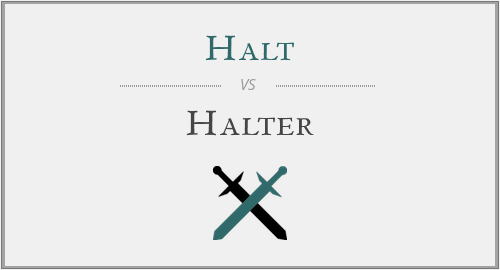Introduction
English is a language known for its complexity, and it often presents words that share similar sounds but have distinct meanings. 'Halt' and 'halter' are two such words that may occasionally be used interchangeably due to their phonetic resemblance. This essay aims to clarify the differences between these terms while acknowledging their similarities.
Similarities
The primary similarity between 'halt' and 'halter' is their similar pronunciation. When spoken, these words can sound nearly identical, making them susceptible to confusion in oral communication.
'Halt'
'Halt' is a verb that signifies the act of stopping or coming to a standstill. It is often used in the context of motion, such as walking, running, or any form of progression, to indicate an abrupt cessation of movement.

Example Usages:
- Verb - Motion: The traffic light turned red, and all the cars had to halt.
- Verb - Progress: The construction work had to halt due to adverse weather conditions.
'Halter'
'Halter' is a noun that typically refers to a type of strap or harness designed for controlling or tethering animals, such as horses or cattle. It is worn around the head and neck of the animal and is used by a handler to guide or restrain the animal's movement.
Example Usages:
- Noun - Animal Control: The cowboy led the horse by its halter across the field.
- Noun - Fashion Accessory: She adorned her pet dog with a colorful halter for a playful look.
Conclusion
In conclusion, 'halt' and 'halter' are words that share a similar pronunciation but have distinct meanings and applications. 'Halt' functions as a verb, indicating the act of stopping or coming to a standstill in various contexts, while 'halter' is a noun commonly used to refer to a strap or harness for controlling animals or, in some cases, as a fashion accessory. Recognizing these differences is essential for accurate and clear communication in both spoken and written English.








Have a discussion about this article with the community:
Report Comment
We're doing our best to make sure our content is useful, accurate and safe.
If by any chance you spot an inappropriate comment while navigating through our website please use this form to let us know, and we'll take care of it shortly.
Attachment
You need to be logged in to favorite.
Log In